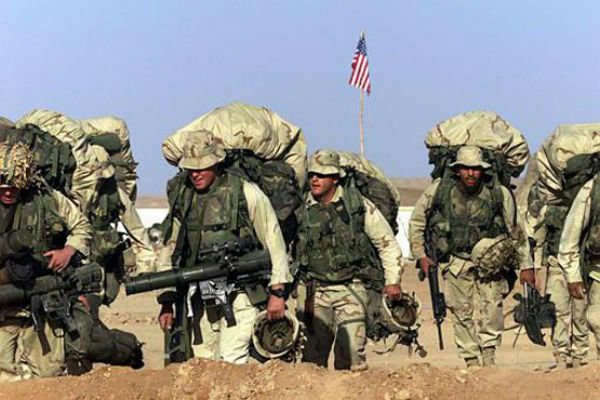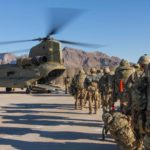A study group appointed by US Congress calls on the Biden administration to slow the withdrawal of US forces from Afghanistan, remove the May 1 exit deadline and instead reduce the number of troops only as security conditions improve in the country.
The report finds that removing international forces by the May 1 deadline set in the US-Taliban peace agreement could lead to a civil war in Afghanistan.
The Afghanistan Study Group began its Congressionally mandated work in April 2020, just weeks after the US and the Taliban signed an agreement on February 2020 on the conditions for a US troop withdrawal that would end US’ long military engagement in Afghanistan.
“We have an interest in an Afghanistan that respects basic human rights. We do not, however, believe that securing these interests requires a permanent US military presence in Afghanistan,” the group said in the report.
The report said that: “An immediate diplomatic effort to extend the current May 2021 withdrawal date in order to give the peace process sufficient time to produce an acceptable result.”
Afghanistan Study Group makes following recommendations for the Afghan peace process: clarify the end state, reinforce the conditionality of a final US troop withdrawal, clarify the US commitment to the current Afghan state, work diplomatically to promote the success of the negotiation process and design an overarching regional diplomatic strategy.
The report has mentioned that a recognition that, in addition to conducting counterterrorism operations and supporting the Afghan forces, a key objective of the ongoing US military presence is to help create conditions for an acceptable peace agreement.
The February 2020 Doha agreement and the subsequent troop reductions clearly demonstrated that the US is prepared to withdraw from Afghanistan. “It should not, however, simply hand a victory to the Taliban,” it said.
“Key consideration of the Study Group was that while we support the values of the Afghan government and recognize that its collapse could create significant problems for the region and beyond, US decisions about America’s presence in Afghanistan cannot be held hostage to the divisions, ineffectiveness, corruption, and shortsightedness that the Afghan government has too often displayed,” the report says.
The report suggested that a reemphasis on diplomacy and negotiation, including a regional diplomatic strategy implemented over the longer term.
“There is broad regional support for a US withdrawal that is responsible rather than precipitate
and chaotic. Many countries in the region, especially Pakistan, have influence over the Taliban and other participants in the peace process. They should actively use this influence to make the peace process successful because they will ultimately benefit from its success,” the report says.
The report adds that Afghanistan’s long conflict has entered a new and potentially final phase: a real opportunity to reach a peaceful resolution exists, but the forces of fragmentation remain strong.
“The United States can play a key role in determining if this opportunity is taken. A responsible and coherent set of US actions could greatly increase the chances of a peaceful resolution to forty years of conflict; a rash and rushed approach could increase the chances of a breakdown of order in Afghanistan and a worsening of this long and tragic war with negative consequences for the region and heightened threats to the security and interests of the United States and its allies,” according to the report.
It also urges the US to maintain it’s commitments which made in its February 2020 agreement with the Taliban, which includes a commitment to withdraw our forces under specific, acceptable conditions.
The Study Group, however, believes that it will be very difficult, and perhaps impossible, for those conditions to be achieved by May 2021, when the agreement states that troops should be withdrawn.
The report further said that achieving the overall objective of a negotiated stable peace that meets US interests would need to begin
with securing an extension of the May deadline.
“This would create the necessary space in which the Study Group’s five recommended main lines of effort could be implemented:
• First, we must refocus our regional diplomacy on securing support for the peace process.
• Second, our civilian and military assistance to the Afghan government must continue to support core state structures, but with conditions derived from the Global Fragility Act that emphasize greater accountability, legitimacy, and inclusion across all lines of assistance and with strong incentives for the government to play a constructive role in the peace process. It is important to emphasize that the objective of aid is not charity but to prevent the sort of state collapse that would be contrary to our interests.
• Third, our military presence in Afghanistan must continue to focus on its counterterrorism function while giving greater emphasis than before to shaping conditions that enhance the prospects of a successful peace process.
• Fourth, the United States, which has long supported Afghan civil society, needs to acknowledge the crucial role that civil society has played in securing critical development gains to date and can play during both the negotiating process and the implementation of an eventual peace agreement.
• Finally, as we enter into this ebbing phase of our involvement in Afghanistan, the United States must not forget that we entered Afghanistan as part of a wider international effort. Our NATO allies in particular have been steadfast in their support and have shared the sacrifice; over a thousand coalition troops have been killed since 2001. Our future in Afghanistan must be decided in consultation with these allies and partners
This report also presents a new way forward that builds on the peace process now underway to carry out a US military exit from the Afghan conflict that secures US interests.
It urges the US work hard to get the two sides to the negotiating table.
“We have had to make concessions to the Taliban and, above all, to put pressure on our allies in Kabul, whose political vision is much closer to our own and who have made tremendous sacrifices by our side during nearly two decades of war. But these talks have started and, although slow-moving, continue,” the report says.
The Study Group’s new pathway for peace in Afghanistan is based on five main recommendations:
• First, the United States should clarify its end state in Afghanistan. The end state should be the following:
An independent, democratic, and sovereign Afghan state with the governance, stability, and security
forces to prevent al-Qaeda, Daesh, and other terrorist groups from attacking the United States and its allies and to contain other potential challenges to US and allied security and interests, including those associated with illicit narcotics and mass migration that threaten our allies and Afghanistan’s neighbors.
An Afghan state that exercises sovereignty over its borders and internal affairs and governs in terms that reflect the popular will and self-determination of the Afghan citizenry while managing conflict peacefully
through accountable civilian institutions. An Afghan state that supports and protects minorities, women’s rights, the democratic character of the state, and a free press but that could include Taliban figures.
An Afghan state that is progressively less reliant on international assistance and is neither a source of regional instability nor a locus of proxy regional competition. A country where the citizens of Afghanistan, who have suffered so much during forty years of war, have the prospect of year-on-year improvements in their prosperity, security, and well-being.
• Second, the United States should explicitly reinforce the conditionality of final troop withdrawal. Although accepting these talks as a potential basis for Afghanistan’s future, the Study Group is convinced that they will not succeed as long as the United States declares itself willing to withdraw its forces regardless of how much or how little progress is made during the negotiations.
According to the Group’s reading of the February 2020 agreement with the Taliban, as well as multiple public statements by Ambassador Zalmay Khalilzad and former Secretary of State Michael Pompeo, the ultimate withdrawal of American troops is conditional on Taliban actions. Whereas the United States has gone beyond its commitments to withdraw forces to date, the Taliban have fallen short of their commitments: they have failed to fulfill their guarantee that they will not “cooperate with groups or individuals threatening the security of the United States and its allies” and will “prevent them from recruiting, training, and fundraising and will not host them.”
The levels of violence they continue to employ against Afghan civilians and security personnel
suggest that they have not yet committed to a negotiated solution. Their escalation of violence in 2020 casts doubt on whether they will come to a workable political compromise with the Afghan government. The Study Group believes that further US troop withdrawals should be conditioned on the Taliban’s demonstrated willingness and capacity to contain terrorist groups, on a reduction in the Taliban’s violence against the Afghan people, and on real progress toward a compromise political settlement.
• Third, the United States should clarify its commitment to the existing Afghan state apparatus and the Afghan National Defense and Security Forces (ANDSF). Support
should be based on the donor conditionality agreed to at the 2020 Geneva conference and on the Afghan government’s contribution to progress in peace talks with the Taliban. In addition, any future political order should secure the gains made in democratic, political, human, and women’s rights, not as an attempt to impose our own values on Afghanistan but because bolstering and respecting rights is essential to securing a lasting peace and reflects the will of the Afghan people.
• Fourth, the United States should conduct an active diplomatic strategy to ensure the success of the peace talks. The United States occupies an influential position as part party to the talks, part facilitator, and (on occasion) hidden mediator. To speed progress at the talks, the United States should promote the appointment of a third-party mediator (ideally by the United Nations) and engage key countries diplomatically as part of any selection process. If stalemates persist at the talks and a third-party mediator is rejected by the parties, the United States should consider the potential benefits and costs of a more direct US arbitration role.
• Fifth, the Study Group’s final recommendation and a major component of its new approach is an overarching regional strategy. Afghanistan lies in the middle of a region beset with rivalries and low levels of trust. These rivalries have played out during our twenty-year presence—as they did during the two decades of conflict preceding our presence—undermining progress toward achieving stability in Afghanistan. Since the beginning of the peace process, however, the prospect of a US withdrawal has created a fragile but real regional consensus behind a stable and neutral Afghanistan that is neither a haven for terrorists nor a fiefdom of the Taliban.
The United States should adopt a diplomatic strategy that seeks to consolidate this consensus, enlist the countries in the region to use their relationships with Afghan actors to promote a successful negotiation, allow the countries of the region to share more equitably the burdens of supporting and sustaining a peaceful Afghanistan, and anchor the process within an international architecture endorsed by the United Nations Security Council.
These lines of effort are intended to be implemented concurrently. They are designed to avoid what has too often happened in the past in Afghanistan, where multiple, competing goals were implemented with insufficient coordination. Our counterterrorism strategy too often collided with our institution-building strategy, and our provision of assistance often had military rather than humanitarian objectives and promoted conflict rather than won allegiance. The focus on the single objective of a negotiated, sustainable, and acceptable end to the conflict provides a clear benchmark against which our messages, policies, and
actions can be coordinated.
No decision on ‘force posture’ in Afghanistan
The Pentagon on Wednesday reiterated that any withdrawal from Afghanistan will be conditions-based.
Pentagon’s spokesman John Kirby in a question about a possible increase in the number of US forces in Afghanistan said that the US Defense Secretary is assessing all options, but said that the best solution to the conflict in Afghanistan is a political settlement of the conflict.
Meanwhile, German Foreign Minister Heiko Maas has said that the withdrawal of foreign troops from Afghanistan should be tied to progress in peace negotiations between the Afghan Republic and the Taliban, rather than “slavishly” bound to an end-of-April deadline.
At the end of April, “these peace talks won’t be over,” Maas said at an event organized by weekly Die Zeit and three other German newspapers. “Our fear is that the Taliban could use this as a reason to leave the peace talks and seek a military solution,” he said.
“So our approach is to say that we must couple both processes, the withdrawal of foreign forces with the peace negotiations,” he said. “We don’t have to hang on slavishly to the date of the end of April — these things must be linked and when the peace negotiations are concluded successfully, the time will have come to withdraw foreign troops.”
But, Suhail Shaheen, a Taliban negotiator, has said that the presence of US forces after May is a violation of the US-Taliban peace agreement.
What does the Taliban say?
The Taliban have said that an Islamic government will replace the current government in Afghanistan under the incumbent President Ashraf Ghani as a result of peace negotiations.
Citing the US-Taliban peace agreement in Doha on February 29, the Taliban have said that based on the deal, an Islamic government will replace the Ghani govt as a result of the intra-Afghan peace negotiations.
In a press conference following their meeting in the Iranian capital Tehran this week, the Taliban’s delegation said that if the US and NATO forces continue to remain in Afghanistan after May, the Taliban will deserve the right to defend their country.
However, the Office of National Security Council (ONSC) has said that it is premature to talk about the political system in Afghanistan.
The ONSC has suggested that the Taliban should stop shedding blood instead of talking about their own government.













